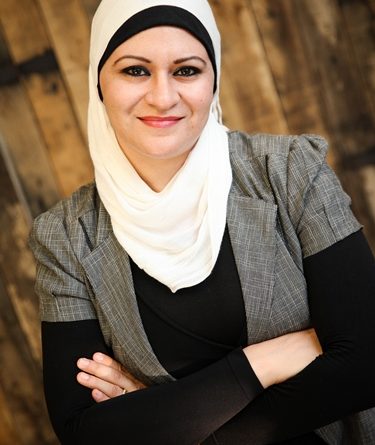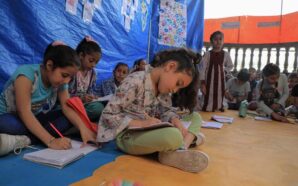Palestine is a land suffering due to conflict, dismal economy and possessing negligible opportunities. It is also a country that has witnessed tremendous growth in its IT sector, with women technologists showing resilience amid social and political restrictions, and shining bright in the digital stratosphere.
Mai Temraz is one such woman! The first Palestinian female licensed amateur radio operator who, in 2014, was featured as one of the “TechWomen Emerging Leaders Honoree Cards” highlighting women leaders working in STEM in San Francisco, USA.
Tell us about yourself
I am a communication engineer, and founder and CEO of Amateur Club Training Center Gaza. I strive to engage young minds in learning science, technology, engineering and math (STEM) using modern methods. Our goal is to promote basic electronics and technology in order for it to occupy a bigger part of the middle school curriculum. For this initiative, I was awarded best entry level STEM Executive 2015 at the “Women in STEM” conference held in Dubai earlier this year.
Additionally, I am a Regional Ambassador for Technovation in the Gaza Strip, a Global Tech Leader representing Palestine and the Gaza Strip, and a member of the ArabWIC Mentorship Committee for the 2015 round.
Recently, I began leading the Mentorship & Women Inclusivity Program at Gaza Sky Geeks, Gaza’s first startup accelerator. I worked on designing, launching and running the next round of Intalqi (GSG women empowerment program). I also manage international mentors visiting GSG, track their mentorship engagements, and train teams on how to manage their mentorship relationships. I started operationalizing the mentorship process at GSG and a way to follow up with incubated startups.
Comment on Palestinian women participation in STEM.
I truly believe women in Palestine today feel confident in the STEM fields more than they do in the United States. More and more girls are considering STEM fields as their careers, though they have to yet to achieve equal roles in the workplace. This can be attributed to a lot of reasons such as the high rate of unemployment, the occupation, and traditional societal expectations from women.
Diversity and inclusivity are the buzzwords these days, what, in your opinion, makes them so critical?
The words “diversity” and “inclusivity” nowadays are all about women in workplaces. It’s also one of the themes that helps any organization to succeed in the 21st century.
Diversity inspires innovation, and an inclusive culture increase engagement, and creativity.
To achieve this, we need to have the ability to harness the diversity already within our community, and build a culture of inclusion with it. To involve everyone – not just women – in order to produce the desired outcome is the essence of inclusion.
Also, the conversation about diversity and inclusion in a community, organization or a group needs to happen between all the members, and not just theoretically around a boardroom table.
What are some of the challenges facing women in tech generally, and especially across the MENA region – with a special focus on Palestine?
The high rates of unemployment, occupation, siege, difficult economic and political situations, traditional societal expectations from women, unconscious bias, etc., these are some of the challenges faced by women in tech in Palestine.
On the other hand, visiting the USA and meeting women from different places showed me that women in America face the same problems we face in the MENA region! The challenges facing women in tech are the same everywhere.
I learned that we need to think of our challenges as opportunities and learn how to manage them. Figuring out how to succeed as an entrepreneur in a very difficult place like Gaza will make it easier to succeed everywhere else. If we share our collective stories of challenges, failures and successes, we can encourage and help each other move forward toward our shared vision of a thriving Gaza startup ecosystem full of startups, building value, growing teams, and creating economic prosperity for Gaza.
How important is inclusivity as far as Palestinian women in STEM are concerned?
It’s very important, as much as we increase women inclusivity in our community it will create the potential for better, more informed decision-making in our societies, and role models who can be an inspiration to millions of women and men worldwide.
We need to keep showing our communities the importance of gender equality and women’s participation, and how diversity and inclusivity can improve our work, society and life
What can be done to empower women in STEM, especially those belonging to conflict areas?
Women in Palestine are more educated than ever before yet still have not yet gotten equality when it comes to roles in the economic side of life. Women in Palestine clearly need to put their hard-won skills into action and start now. To empower women, we need to:
- Increase women’s self-confidence and create a community of women that believe in each other.
- Provide them access, resources, networking and mentoring which will empower women and allow them to start their professional lives, and to prove that they can succeed.
- Allow women to find a place to learn, work, innovate and engage in learning new technologies.
- Introduce them to the opportunity of a mentoring relationship, and show how it will support, guide, and encourage them to define their goals and plans, overcome obstacles and achieve personal and professional success.
What entails empowerment?
Empowering women helps them become more productive, as those kinds of outcomes will empower them to become stronger leaders, and to more effectively contribute financially to their families, communities and countries.
Anything you wish to add.
I want to live in a community that believes in women participation and their roles in all fields, especially STEM. We need to introduce our communities continuously to female role models, and show them the changes women have made.
I believe that it’s us who will make the difference we want to see in our communities.











